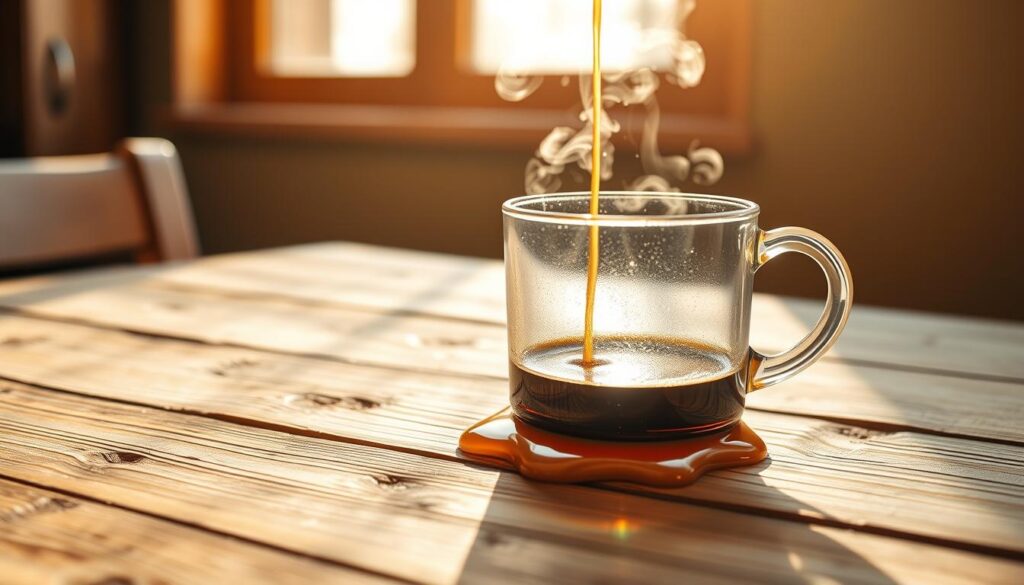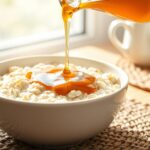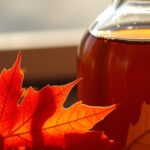Start your day with a sweet treat that changes your coffee time. Maple syrup in coffee is more than a trend; it’s a tasty change for many in North America. It swaps out regular sugar for a natural sweetener that adds depth and flavor to your coffee.
Sugarmakers have always loved maple syrup, and now coffee fans are too. This golden syrup does more than sweeten. It adds a unique flavor that makes your coffee special.
Maple syrup and coffee share a special bond. It’s a mix of two favorite drinks that celebrate North American traditions. Whether you like a light roast or a strong espresso, maple syrup fits right in.
For coffee lovers, maple syrup is a better choice than sugar. It’s full of minerals and has a unique taste that sugar can’t match. Each spoonful brings the taste of the forest and the season, making your coffee a treat for the senses.
This guide will show you how to add maple syrup to your coffee. You’ll find out how to mix it, try new flavors, and see why it’s a favorite for coffee fans in the U.S.
Why Maple Syrup is the Perfect Coffee Sweetener
Coffee lovers are finding a new favorite: maple syrup. It changes how we enjoy our morning coffee. Maple syrup adds a special flavor that makes coffee taste better than with sugar.
Maple syrup adds something special to your coffee. It’s not like regular sugar. This golden syrup has a deep, rich taste that goes well with coffee.
Understanding Natural Sweetness Profiles
Maple syrup makes coffee sweet in a unique way. It has:
- Subtle caramel undertones
- Gentle sweetness without overwhelming bitterness
- Smooth, balanced flavor integration
Health Benefits of Choosing Maple Over Refined Sugar
Choosing maple syrup for your coffee has health perks. It’s full of minerals and has a lower sugar impact than regular sugar.
The Science Behind Maple’s Smooth Flavor Integration
Maple syrup’s molecular structure makes it blend well with coffee. It enhances coffee’s taste without covering it up. This creates a perfect harmony of flavors.
Maple syrup transforms coffee from a simple beverage into a gourmet experience.
The Rich History of Maple Syrup in North American Culture

Native American tribes first found out how to turn maple tree sap into liquid gold long before Europeans came. They learned how to harvest and process maple syrup, seeing it as a vital food source.
When European settlers arrived, they learned from the Native Americans how to make maple syrup. They saw its value and it became a key part of American food. Making maple syrup helped many rural communities in northeastern North America.
- Indigenous tribes used maple sap as a primary energy source
- Early settlers adopted maple syrup production methods
- Maple trees became a key economic resource for rural communities
By the 19th century, maple syrup went from being a survival tool to a favorite food. Families would come together during late winter and early spring for sugaring season. They would turn maple tree sap into the sweet syrup we love on pancakes.
“Maple syrup represents more than just a sweetener – it’s a connection to our agricultural heritage.” – Traditional Sugarmaker
The name “liquid gold” came from the hard work needed to make maple syrup. It takes about 40 gallons of sap to make just one gallon of syrup. This makes it a valuable and respected part of North American food culture.
Maple Syrup in Morning Coffee: Your New Favorite Ritual
Want to make your morning coffee better? Try adding maple syrup. It’s a natural sweetener that adds richness and depth to your coffee.
To make maple-sweetened coffee, you need to know a few tricks. These will take your morning coffee from good to great.
Best Temperature for Adding Maple Syrup
When adding maple syrup to your coffee, temperature matters. It’s best to add it when the coffee is between 160-180°F. This ensures the syrup blends well and tastes great.
- Let the coffee cool a bit after brewing
- Pour syrup when it’s warm but not too hot
- Don’t add syrup to boiling coffee
Optimal Syrup-to-Coffee Ratios
Getting the right amount of maple syrup is key. It depends on how strong you like your coffee and your taste. Here are some starting points:
- Light roast: 1 teaspoon per 8 oz cup
- Medium roast: 1-2 teaspoons per 8 oz cup
- Dark roast: 2-3 teaspoons per 8 oz cup
Stirring Techniques for Perfect Integration
Stirring your coffee with maple syrup is important. Gentle, circular motions are best. They help the syrup mix evenly without changing the coffee’s taste.
- Use a long-handled spoon
- Stir slowly and consistently
- Mix for about 15-20 seconds
Selecting the Right Grade of Maple Syrup for Coffee
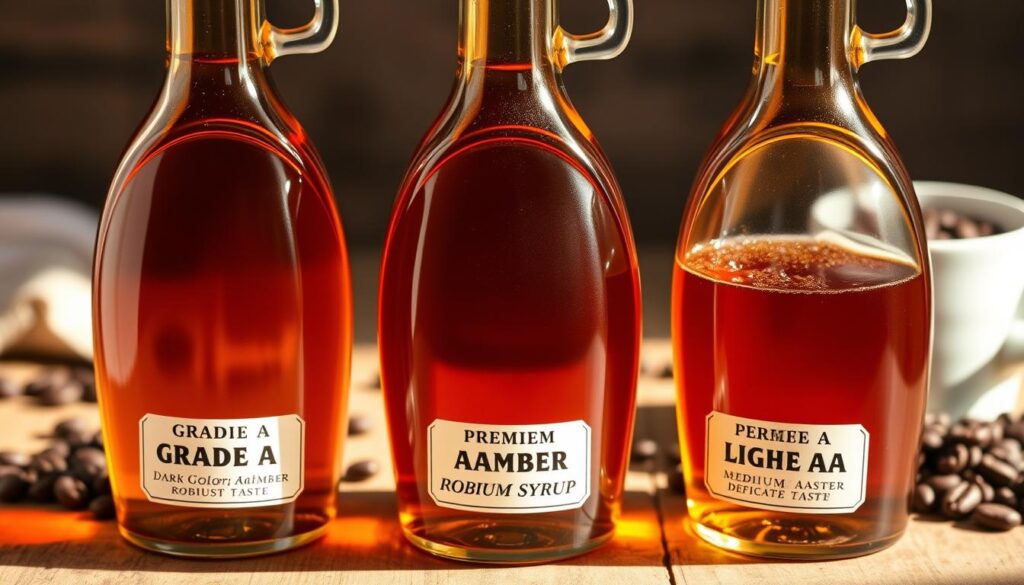
Choosing the right maple syrup can change how you enjoy your coffee. Each grade has its own taste that can make your coffee even better.
The maple syrup grading system helps you pick the best maple flavor for your coffee. These grades go from light to dark. Each one adds something special to your coffee:
- Golden Color, Delicate Taste: Great for lighter roast coffees, adding a soft maple flavor
- Amber Color, Rich Taste: Best for medium roast coffees, adding a sweeter taste
- Dark Color, Robust Taste: Ideal for dark roast coffees, bringing strong maple notes
When picking maple syrup for your coffee, think about your coffee’s roast and what you like. Lighter syrups are good for lighter coffees, and darker syrups are better for bolder ones.
Pro tip: Start with small amounts and adjust to find your perfect maple flavor balance.
Sugarmakers make each grade to give you a natural sweetness. Knowing these differences lets coffee lovers make their mornings even better with the right maple syrup.
How to Create the Perfect Maple-Sweetened Coffee Experience
Turning your morning coffee into a masterpiece with maple syrup is an art. It mixes flavor, technique, and passion. Maple syrup, as a coffee sweetener, brings a unique taste that makes your coffee special.
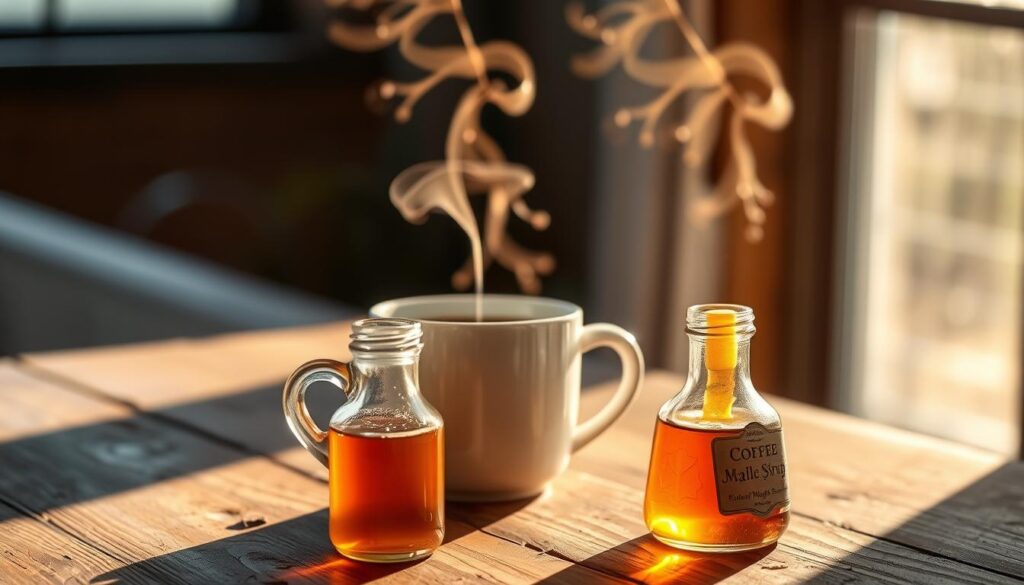
To make the perfect Maple Syrup in Morning Coffee, pay close attention to detail. Knowing how coffee and syrup work together is key. This can make your coffee a special part of your day.
Step-by-Step Mixing Guide
- Start with freshly brewed, hot coffee
- Choose pure, high-quality maple syrup
- Pour syrup gradually while stirring
- Taste and adjust sweetness to preference
Equipment Recommendations
- Wooden stirring spoon for smooth integration
- Ceramic or glass mug to preserve temperature
- Digital kitchen scale for precise measurements
Temperature Considerations
The best temperature for adding maple syrup to coffee is between 155-165°F. This temperature lets the syrup mix well, keeping the coffee’s taste just right.
“Maple syrup isn’t just a sweetener—it’s a flavor enhancer that transforms your morning coffee into a culinary experience.” – Artisan Coffee Experts
Getting good at maple-sweetened coffee takes time. But the natural sweetness is worth the effort.
Comparing Different Coffee Brewing Methods with Maple Syrup
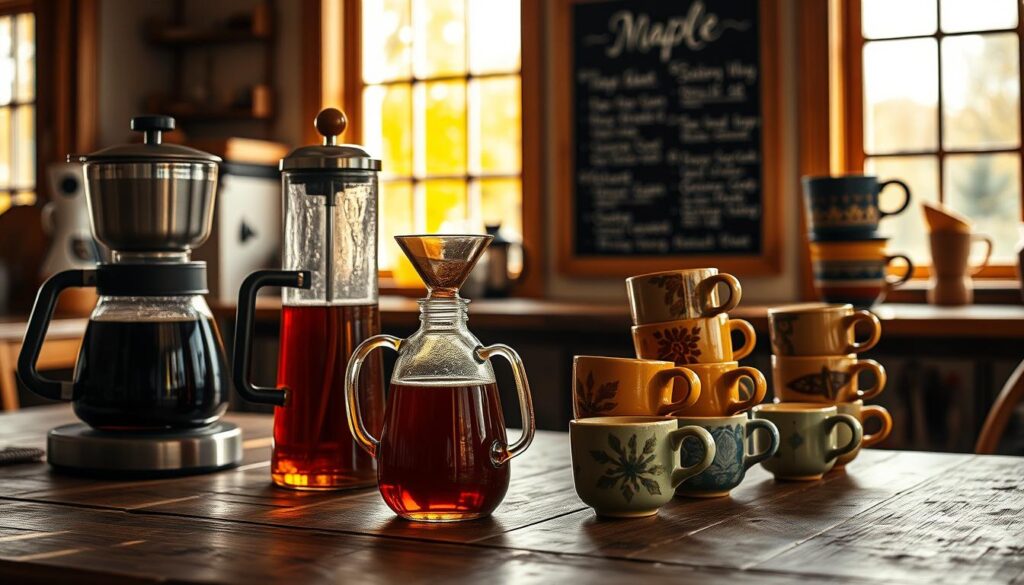
Exploring coffee flavoring with maple syrup shows how different brewing methods interact. Each method has its own way of making the perfect morning coffee. It adds natural sweetness to your coffee.
Drip coffee is a great place to start with maple syrup. The steady flow mixes the syrup and coffee smoothly. This creates a sweet coffee that brings out the coffee’s best flavors. You can play with syrup amounts to find your favorite taste.
- French Press: Offers rich, full-bodied results with maple syrup
- Espresso: Creates intense flavor concentration
- Cold Brew: Provides smooth, less acidic maple infusion
Espresso-based drinks have a stronger flavor. The intense brewing process makes the maple syrup’s sweetness stand out. It matches the strong coffee taste perfectly.
Cold brew is special for maple-sweetened coffee. The long brewing time lets the maple syrup blend well with the coffee. This makes a smooth and balanced coffee for the morning.
Pro tip: Start with small amounts of maple syrup and adjust to taste for each brewing method.
How you brew and the temperature matter a lot. Trying different methods can help you find your favorite maple-sweetened coffee.
Nutritional Benefits of Using Maple Syrup as a Coffee Sweetener
Maple syrup is a natural sweetener that makes your coffee a nutritional powerhouse. It’s different from refined sugar because it offers health benefits. It’s a smart choice for those who love their coffee sweet.
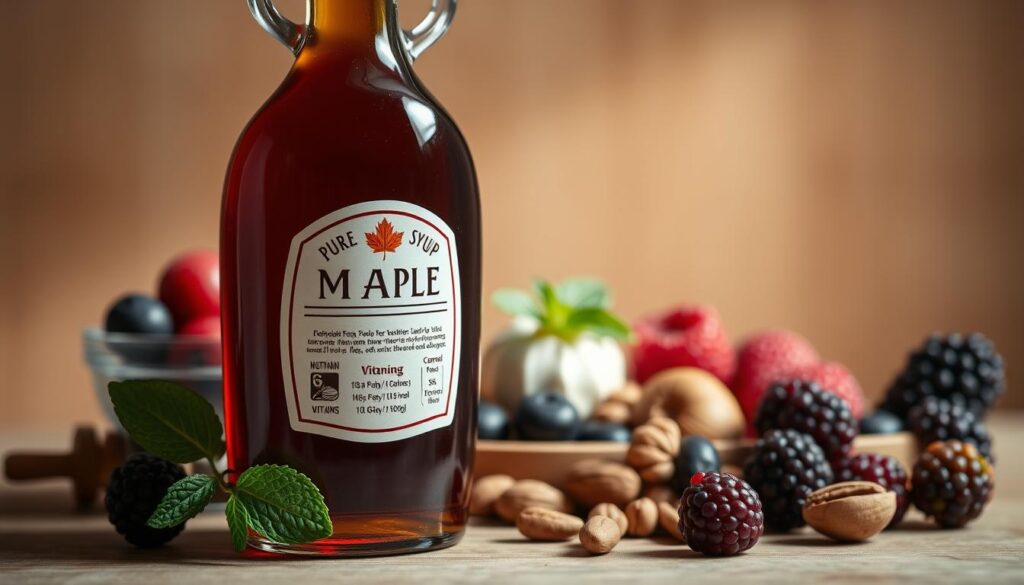
Maple syrup is packed with essential minerals and compounds. These help improve overall health and wellness.
Mineral-Rich Natural Sweetener
Maple syrup is rich in minerals. It has important elements that help our bodies function well:
- Manganese: Supports bone health and metabolism
- Zinc: Boosts immune system function
- Potassium: Regulates heart and muscle performance
Powerful Antioxidant Properties
Maple syrup has a lot of antioxidants. Researchers have found over 24 different antioxidant compounds. These help fight off cellular damage and support health.
Glycemic Index Comparison
| Sweetener | Glycemic Index | Impact on Blood Sugar |
|---|---|---|
| White Sugar | 65 | High spike |
| Maple Syrup | 54 | Moderate release |
| Honey | 58 | Moderate spike |
Using maple syrup in your coffee is a balanced choice. It gives you energy without causing big blood sugar spikes.
Creative Coffee Recipes Featuring Maple Syrup
Make your morning coffee special with maple syrup-infused recipes. They turn a simple breakfast into a tasty adventure. Maple syrup adds a natural sweetness that’s better than sugar.
- Maple Cinnamon Latte: Mix espresso, steamed milk, and maple syrup. Top with cinnamon.
- Cold Brew Maple Delight: Combine cold brew, maple syrup, and cream for a cool drink.
- Maple Cappuccino: Add maple syrup to the milk while steaming for a sweet foam.
These recipes add flavor and make breakfast healthier. Maple syrup’s natural minerals match coffee’s bold taste, making it a perfect pair.
Pro tip: Always use pure, grade A maple syrup for the most authentic and rich flavor in your morning coffee.
Try different maple syrup grades to find your favorite. Light amber syrup is subtle, while dark amber is stronger. Coffee lovers will enjoy the dark amber’s intense maple taste.
Storage Tips for Maintaining Maple Syrup Freshness
Keeping your maple syrup fresh is key. It’s perfect for pancakes or as a coffee sweetener. To keep its rich flavor, you need to store it right.
Choosing the right container is the first step. The container you pick is very important. It helps keep the syrup’s quality and stops it from getting contaminated.
Selecting the Perfect Storage Container
- Use glass containers with tight-sealing lids
- Avoid plastic containers that can leach chemicals
- Choose food-grade stainless steel for larger quantities
- Ensure containers are clean and sterilized before use
Temperature and Environment Management
Keeping the syrup at the right temperature is vital. Extreme temperatures can ruin its special taste.
- Refrigerate after opening to extend shelf life
- Keep unopened syrup in a cool, dark pantry
- Maintain consistent temperatures between 32-40°F
- Avoid direct sunlight and heat sources
Pro tip: Always check for signs of mold or crystallization. If you notice any changes, it’s best to discard the pancake syrup to ensure food safety.
By following these tips, you’ll keep your maple syrup in top shape. It will stay a wonderful part of your cooking.
Common Mistakes to Avoid When Using Maple Syrup in Coffee
Using maple syrup in coffee needs care. Many people make small mistakes that affect the maple flavor and the coffee’s taste.
Here are some common mistakes to watch out for:
- Pouring Too Much Syrup: Start with a small amount. Maple syrup is strong, and too much can ruin the coffee’s taste
- Using Cold Syrup: Warm maple syrup mixes better. Cold syrup can make the sweetness and texture uneven
- Selecting Incorrect Syrup Grade: Lighter grades are best for coffee. They add a subtle maple flavor without too much bitterness
Temperature is key when mixing maple syrup with coffee. Using syrup at room temperature or slightly warmed helps it dissolve better and keeps the flavor even.
Experts say to use pure, high-quality maple syrup. Cheaper syrups might have additives that spoil the coffee’s taste.
Maple syrup isn’t just a sweetener—it’s a flavor enhancement that transforms your coffee experience.
By experimenting carefully, you can find the perfect mix of coffee’s bold taste and maple’s sweetness.
Seasonal Variations in Maple Syrup Quality and Taste
Maple syrup fans know it changes a lot during the season. Its taste comes from the mix of temperature, tree health, and when it’s tapped.
The maple syrup making process shows amazing taste changes with the seasons:
- Early Season (Light Syrup): Delicate and mild flavor profile
- Mid-Season (Medium Syrup): Balanced sweetness with robust undertones
- Late Season (Dark Syrup): Intense, complex flavor with stronger caramel notes
Weather affects the syrup’s taste a lot. Sugarmakers watch the temperature closely when tapping trees. This affects the syrup’s taste.
| Season | Flavor Characteristics | Color Grade |
|---|---|---|
| Early Spring | Light, delicate | Golden |
| Mid-Spring | Rich, balanced | Amber |
| Late Spring | Deep, intense | Dark |
Coffee lovers can try different maple syrups for new tastes. Each batch has its own flavor, showing the exact harvest time and weather.
The magic of maple syrup lies in its ability to capture the essence of a specific moment in nature’s annual cycle.
Environmental Impact of Choosing Maple Syrup Over Artificial Sweeteners
Choosing maple syrup for coffee is more than a taste choice. It’s a choice that helps the environment and cuts down on carbon emissions. This is compared to using artificial sweeteners.
Maple syrup production has big benefits for the planet. Maple forests help fight climate change and offer a green choice for coffee lovers.
Sustainable Forest Management Practices
Maple syrup shows great care for the environment through smart forestry. Sugarmakers use careful methods to protect the forest:
- Selective tree tapping that minimizes forest damage
- Maintaining forest biodiversity
- Protecting wildlife habitats
- Preventing soil erosion
Carbon Footprint Comparison
Maple syrup beats artificial sweeteners in carbon emissions. Its production process makes much less greenhouse gas:
| Sweetener Type | Carbon Emissions (kg CO2e) |
|---|---|
| Maple Syrup | 0.5 – 1.2 |
| Artificial Sweeteners | 2.5 – 4.7 |
By picking maple syrup for coffee, we support green farming and lessen our environmental footprint.
Artisanal Coffee Shop Trends Using Maple Syrup
Artisanal coffee shops in the United States are now using maple syrup. This natural sweetener has changed how we enjoy coffee. It adds a unique twist to our favorite drinks.
Locally sourced ingredients are becoming more popular. Maple syrup is at the forefront of this trend. Coffee shops are making new drinks that highlight its rich flavors.
- Maple-infused espresso drinks
- Cold brew with maple syrup
- Specialty seasonal maple coffee creations
Baristas find that maple syrup does more than sweeten coffee. Its unique flavor enhances coffee’s bold taste. This makes for a more complex and enjoyable drink.
| Coffee Shop Trend | Maple Syrup Application | Unique Characteristic |
|---|---|---|
| Craft Coffee Bars | Maple Latte | Local maple sourcing |
| Sustainable Cafes | Maple Cold Brew | Organic maple syrup |
| Gourmet Coffee Shops | Maple Cappuccino | Small-batch maple infusion |
People want natural sweeteners that taste good and are good for them. Maple syrup is a top choice. It’s a healthier option than regular sugar.
“Maple syrup transforms an ordinary coffee into an extraordinary experience,” says Rachel Martinez, a leading coffee consultant in Portland, Oregon.
The trend of using maple syrup in coffee is part of a bigger movement. It’s about valuing real, unprocessed ingredients. Coffee lovers see maple syrup as more than a trend. It’s a culinary shift.
Conclusion
Maple syrup is more than just a sweetener. It brings flavor and nutrition to your morning coffee. We’ve shown how maple syrup can change your coffee game.
Maple syrup in coffee is not just about taste. It’s a mix of health, environment, and tradition. It’s good for you and the planet, making it a great choice for coffee lovers.
Adding maple syrup to your coffee can make it a special moment. You can learn about different maple syrup grades and how to brew it. This turns your coffee into a unique experience.
Maple syrup is perfect for coffee lovers or those who want to eat better. It makes your morning coffee special. Try it and enjoy the taste of tradition and nature.

